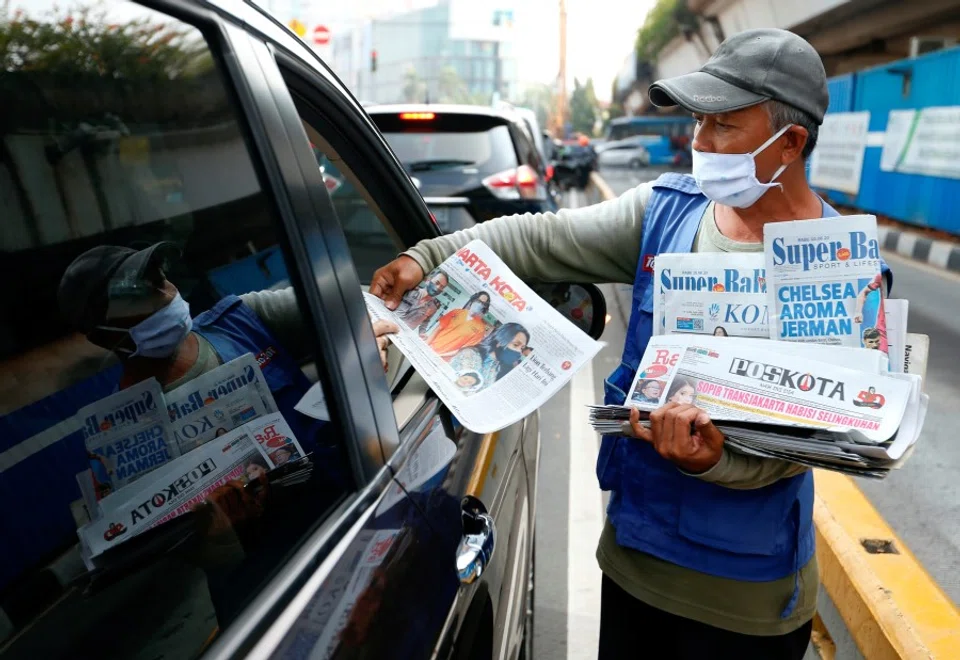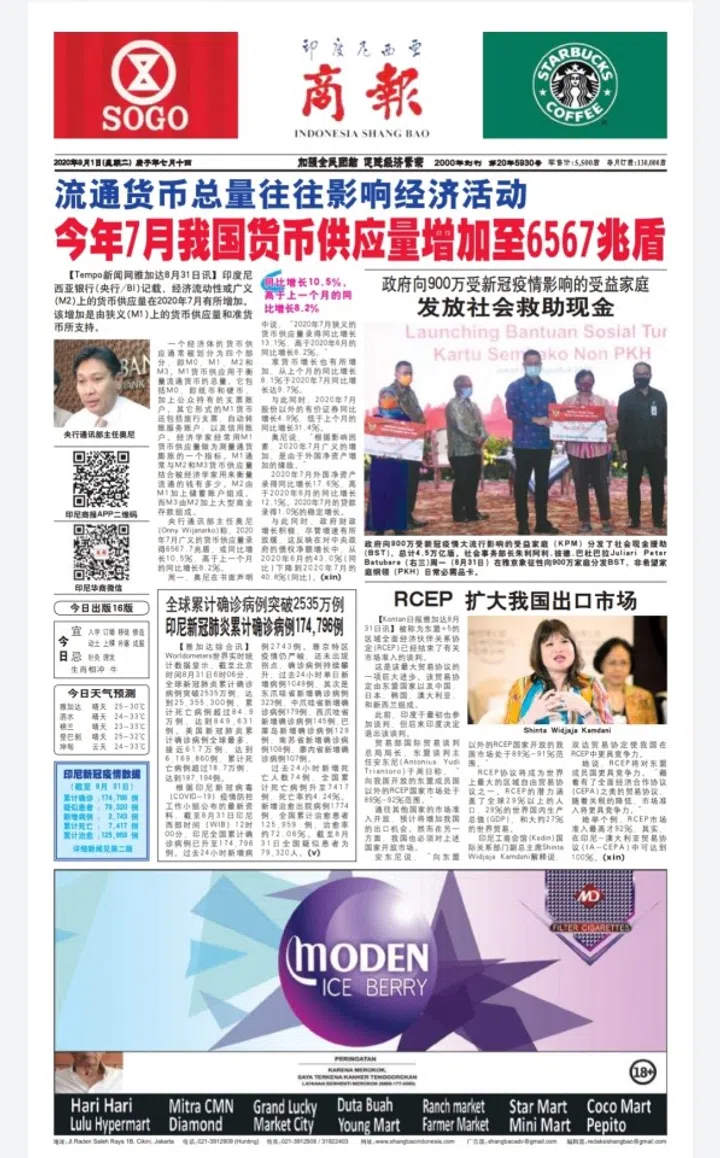Rising China: Indonesia's Chinese-language newspapers avoid taking sides
All six Chinese-language newspapers in Indonesia support closer economic co-operation with Beijing, and all are pro-Beijing when reporting on Taiwan and Hong Kong issues, except for one. Chinese-language newspapers also face other issues such as insufficient readership and advertisement revenue, and a dearth of journalists. ISEAS academic Leo Suryadinata takes a closer look at the papers' predicaments with a rising China on one hand, and a diminishing pool of local readers on the other.

Between late December 2019 and early January 2020, several Chinese fishing boats and coast guard vessels entered Indonesia's Natuna waters illegally, creating diplomatic tensions between Jakarta and Beijing. Indonesian newspapers reported on these incursions, expressing Indonesia's point of view.
On 2 January 2020, Kompas, the largest newspaper in the country, published a report titled "Indonesia Rejects China's Claims". The following day, Tempo, a leading news magazine and daily newspaper, published a report with a similar headline: "Indonesia Clearly Rejects China's Claim Over the Northern Natuna Sea". That same day, CNN Indonesia published a provocative report with the headline: "China's vessels enter Natunas, the Indonesian National Army get ready to fight."
Apparently, Indonesian official responses were not united. While some took a harder line, Luhut Pandjaitan (Co-ordinating Minister of Maritime Affairs and Investment) and Prabowo Subianto (Minister for Defence) downplayed the issue.
Chinese-language newspapers cautious in expressing views on Natunas
What was the response of the Chinese-language newspapers in Jakarta?
Yindunixiya Shangbao (印度尼西亚商报) published a report on its front page with the title "Indonesia strongly rejects the claims of China over the Nansha islands", which is the translation of the Indonesian foreign ministry statement. While Yinni Xingzhou Ribao (印尼星洲日报) and Yinhua Ribao (印华日报) published a similar report on page 3, Guoji Ribao (国际日报), the largest Chinese-language newspaper in Indonesia began to follow the events closely from 6 January 2020 for three days, and on the front page. The first report was titled "Luhut: Don't Play Up the Chinese Fishing Vessels Event". All the reports were translations from Indonesian sources. Interestingly, unlike during the 2016 Chinese incursions, this time they carried no commentaries on the Natunas, indicating caution on their part in expressing their views.

What is the situation of the Chinese-language newspapers in Indonesia today? How important is the Chinese press to the Chinese Indonesian community? What are their political orientations, especially towards a rising China? What are their problems and prospects?
The Chinese Indonesian community comprises Indonesian-speaking Peranakans and Chinese-speaking Totoks. Chinese newspapers mainly cater to the Totoks rather than the Peranakans. There were already quite a few Chinese-language newspapers in Indonesia before the New Order, but when the anti-communist General Suharto came to power, all Chinese-language newspapers and magazines were banned. The New Order government only allowed the new bilingual Yindunixiya Ribao (印度尼西亚日报, Indonesian name: Harian Indonesia) to operate and it was run by the military, and was in reality divided into a Chinese section and an Indonesian section. The contents were mainly translations of government regulations and advertisements. This newspaper, despite its low standards, was profitable, being the only avenue for totok readers to place paid advertisements or family notices.
The re-emergence of Chinese-language newspapers
After the fall of Suharto in late May 1998, Chinese-language newspapers and magazines re-emerged. On 23 January 2000, Wu Nengbin (吴能彬 alias Purnomo Nurdin), founder of the Partai Bhineka Tunggal Ika Indonesia (Unity in Diversity Party), published Heping Ribao (和平日报, Harian Umum Perdamaian) in Jakarta.
Indigenous businessmen who were in the media business such as Harmoko, the former chairman of Golkar, started the Chinese daily Xin Shenghuo Bao (新生活报, Harian Hidup Baru, February 2000) in Jakarta, followed by the Matahari group's Long Yang Ribao (龙阳日报, Harian Naga Surya, March 2000) in Surabaya. Within one year, at least six Chinese dailies had emerged in Jakarta, two in Surabaya and one in Medan.
It seems that the Indonesian government is no longer concerned with the distribution of foreign Chinese language newspapers in Indonesia, not even Beijing's People's Daily.
In Jakarta, apart from the abovementioned Yindunixiya Ribao and Heping Ribao, in April 2000, the Sukamdani Group which was linked to Suharto, started Yindunixiya Shangbao (印度尼西亚商报, Indonesia Shangbao) in April 2000. The following year, Guoji Ribao (国际日报, International Daily) was established by Xiong Delong (熊德龙, Ted Siong), who was originally from Indonesia, and who also has a newspaper of the same name in the US. The US's Guoji Ribao was established in 1981, and its Indonesian version came into being in January 2001. Initially, Ted Siong was supported by a group of Hakka businessmen, but in 2012, the group withdrew from the project, and the Mayapada Group led by Tahir (Weng Junmin, 翁俊民) joined as its major shareholder.

Guoji Ribao also collaborates with the Jawa Pos Group of Surabaya. It is worth noting that Guoji Ribao is not only a Chinese Indonesian newspaper but also serves as a partner for overseas editions of Beijing's Renmin Ribao (人民日报海外版, People's Daily Overseas Edition), the Southeast Asian edition of Hong Kong's Wenhui Bao (文汇报), Hong Kong's Shangbao (商报) and various Chinese Indonesian "newspapers". These newspapers are put together with the Guoji Ribao for distribution. Although Indonesia-oriented, it functions as an "international" Chinese newspaper. It seems that the Indonesian government is no longer concerned with the distribution of foreign Chinese-language newspapers in Indonesia, not even Beijing's People's Daily.
In June 2001, a large Taiwanese media group, the United Daily News Group (联合报系) established Shijie Ribao (世界日报, Universal Daily News); initially it had the potential to become a major daily in Jakarta but its readership continued to decline and the advertisements were not forthcoming. The newspaper closed down on 1 March 2007.
The editorial group is from the Sin Chew group but the newspaper takes an Indonesian perspective. The above examples show that post-Suharto, Chinese-language Indonesian newspapers were internationalised, if not globalised in terms of capital, personality and contents.
Yindunixiya Ribao remained the leading Chinese newspaper up till 2002 with a circulation of 20,000 while Guoji Ribao with a 10,000 circulation ranked second. Yindunixiya Ribao fell behind as time passed and was later purchased by Indonesian media company Mahaka Media, which also published the Indonesian-newspaper Respublika, a pro-Muslim daily that is often critical of the Chinese Indonesian community.
On 17 January 2007, Yindunixiya Ribao partnered with the Xingzhou Ribao (星洲日报, Sin Chew Jit Poh) of Malaysia. The Indonesian name of the new daily remained Harian Indonesia, but the Chinese name was changed from Yindunixiya Ribao to Yinni Xingzhou Ribao (印尼星洲日报, Indonesia's Sin Chew Daily). Those who only read Indonesian might have thought that it was the old Harian Indonesia, but in fact it was a new Chinese-language newspaper. The editorial group is from the Sin Chew group but the newspaper takes an Indonesian perspective. The above examples show that post-Suharto, Chinese-language Indonesian newspapers were internationalised, if not globalised in terms of capital, personality and contents.
The problems faced by Chinese-language newspapers
Chinese-language newspapers in Indonesia, particularly in Jakarta, are facing a lot of problems. Apart from Guoji Ribao, the other three - Yinni Xingzhou Ribao, Yindunixiya Shangbao and Yinhua Ribao - are not making money. There are simply not enough subscribers and readers.
One informed source noted that there are about 30,000 Chinese-language newspaper readers/subscribers in Indonesia, the largest group being in Jakarta - and they are all competing for limited resources and readership.
Since the readership and advertisements were limited, many Chinese newspapers failed to compete and ceased publication soon after being established. For example, Long Yang Ribao survived only for one year and eight months, and Xin Shenghuo Bao managed to stay afloat for two years and four months. Heping Ribao lasted only two years. Guoji Ribao is arguably the largest newspaper in Jakarta/Indonesia today.
One informed source noted that there are about 30,000 Chinese-language newspaper readers/subscribers in Indonesia, the largest group being in Jakarta - and they are all competing for limited resources and readership. Besides, the writers and journalists who are able to work for these newspapers are also very limited. One newspaper director suggested merging the existing Chinese-language newspapers. However, this is unlikely to happen since the groups have very different interests.
First of all, Guoji Ribao is already making money and there is no reason why it should merge with three other papers which are not profitable. Furthermore, the other three are owned and run by different business groups who do not have a common interest. Worse yet, there are personality problems which makes merger impossible. Even within the Hakka Chinese community, there are several newspapers competing with each other.
All Chinese newspapers, with the exception of Yinni Xingzhou Ribao, have been supporting China in disputes between Beijing and Taipei, on the Hong Kong issue and on the Beijing-Washington tussle. They are also particularly enthusiastic about economic cooperation between Jakarta and Beijing.
Apart from the Jakarta-based newspapers, Qiandao Ribao (千岛日报, Harian Nusantara, established in October 2000) in Surabaya remains a local paper. Recently it was rescued from being closed down by public donations. In Medan, there is a Chinese daily called Xun Bao (讯报, established in 2007), which is also a local newspaper. These local newspapers have small circulation but fulfill the needs of the local Chinese-speaking population.

Political orientation of Chinese-language newspapers
One major characteristic of the post-Suharto Chinese-language newspapers is that the source of capital is not only Indonesian, but also foreign. Their writing and reporting are regional, if not global in orientation. The rise of China appears to have had a major impact on them. As China's influence grew in Indonesia, they became more pro-Beijing rather than pro-Taiwan. The only pro-Taipei newspaper, Shijie Ribao, was unable to survive since many business groups prefer to advertise in "pro-Beijing" or non-Taiwan-linked newspapers, which are in any case better established and larger in number. It has apparently become much more difficult for Chinese newspapers in Indonesia to be neutral when discussing China.
All Chinese newspapers, with the exception of Yinni Xingzhou Ribao, have been supporting China in disputes between Beijing and Taipei, on the Hong Kong issue and on the Beijing-Washington tussle. They are also particularly enthusiastic about economic cooperation between Jakarta and Beijing.
Except for Xingzhou, these newspapers use mainland Chinese news agencies reports on China and International events. To be sure, Xingzhou uses its own sources, compiles its own news reports based on Western and China news and hence present more balanced reports. Xingzhou has been able to do this because it shares resources with the Kuala Lumpur Xingzhou Ribao.
However, during the 2016 conflict between Beijing and Jakarta over the Natuna territorial waters, Chinese-language newspapers in Indonesia got caught in between.
Since China no longer stresses the communist ideology overseas, many Chinese Indonesian newspapers find it easier to accept Beijing. Many Chinese newspapers in Indonesia have supported the rise of China provided that this does not come into conflict with Indonesian national interests. For instance, Indonesian Chinese newspapers openly and enthusiastically supported the Beijing Olympics and considered the games the pride of the Chinese regardless of citizenship. However, when a Beijing official in Jakarta urged Chinese Indonesians to learn Hanyu (i.e. Beijing's Mandarin) "to strengthen their national identity" with China, some Chinese Indonesian newspapers criticised the official for causing trouble for the Chinese community.
With regard to the "One Belt One Road" initiative (BRI) of China, Indonesian Chinese newspapers have also offered their support as it is seen to be in parallel with the Indonesian "Maritime Road" (Tol Laut) concept. However, during the 2016 conflict between Beijing and Jakarta over the Natuna territorial waters, Chinese-language newspapers in Indonesia got caught in between. They reported the arguments of both sides but one newspaper (Yinhua Ribao) tended to publish more information about China's point of view. The editorials and opinion articles in general expressed hope for a peaceful settlement between the two countries.
In general, the Chinese Indonesians born after 1965 do not read Chinese newspapers at all. It is fair to say that the Chinese-language newspapers have not in fact affected the younger generation of Chinese Indonesians.
During the recent conflict in December 2019 and January 2020, as analysed above, Indonesian Chinese-language newspapers became more careful in presenting the reports and did not publish any editorials and opinion pieces for fear of offending the Indonesian authorities. This is quite different from their responses to the 2016 incursions. The situation has indeed become more serious and the Indonesian ruling elite views are divided. The Chinese newspapers do not want to take sides.
Chinese newspapers unlikely to develop further
The 32 years under Suharto (1966-1998) had almost eliminated the Chinese language in Indonesia. Chinese schools were closed in early 1966, meaning that Chinese Indonesians under 55 years of age today have not attended Chinese schools and are therefore usually unable to read Chinese. In other words, only old Chinese and migrants read Chinese-language newspapers. In general, the Chinese Indonesians born after 1965 do not read Chinese newspapers at all. It is fair to say that the Chinese-language newspapers have not in fact affected the younger generation of Chinese Indonesians.

Nevertheless, there is still a demand for Chinese newspapers, especially from the older generation of Chinese Indonesians who also have the purchasing power. Even the Metro TV, which is owned by an indigenous Indonesian named Suryo Paloh, has the Meidu Xinwen (美都新闻 Metro News in Chinese. However, the broadcast time in Chinese is limited.
With the rise of China, some Chinese-language teachers have come to Indonesia to teach, and many students from China also study in various private Indonesian universities. These Chinese students or teachers are the new writers, journalists and readers of Chinese-language newspapers in Indonesia. However, as Indonesia continues to have restrictions on new Chinese migrants, the number of Chinese-speaking new migrants remains small. With the decreasing number of Chinese-speakers and readers among Chinese Indonesians, the Chinese newspapers are unlikely to develop further.
This article was first published as ISEAS Perspective 2020/91 "Chinese-Language Newspapers in Indonesia: Declining Readership, Advertisement Revenue and Dearth of Journalists/Writers" by Leo Suryadinata.





![[Photos] Fact versus fiction: The portrayal of WWII anti-Japanese martyrs in Taiwan](https://cassette.sphdigital.com.sg/image/thinkchina/3494f8bd481870f7c65b881fd21a3fd733f573f23232376e39c532a2c7593cbc)